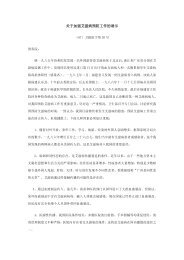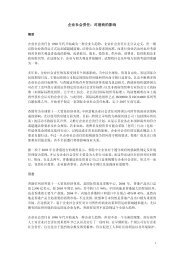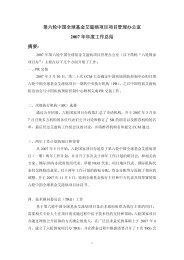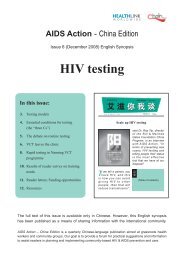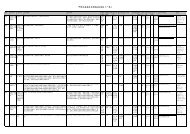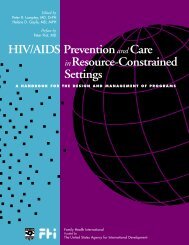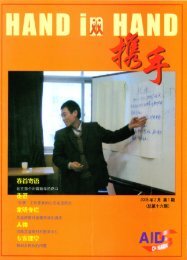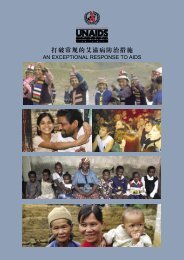The Training of Trainers Manual - UNFPA
The Training of Trainers Manual - UNFPA
The Training of Trainers Manual - UNFPA
Create successful ePaper yourself
Turn your PDF publications into a flip-book with our unique Google optimized e-Paper software.
<strong>Training</strong> topic<br />
Peer education – theory and practice<br />
Objectives <strong>of</strong> the session<br />
To help participants to understand the nature and purpose <strong>of</strong> peer education and<br />
to gain insight into the mechanisms <strong>of</strong> behaviour change and how these relate to<br />
peer education.<br />
Exercise: Peer education − what and why<br />
Objectives<br />
To have a common understanding <strong>of</strong> the concept <strong>of</strong> peer education<br />
30<br />
minutes<br />
Materials<br />
To identify the benefits and the limits <strong>of</strong> peer education<br />
Three flip charts and markers<br />
Process<br />
Prior to this exercise, review the content in Section 1.<br />
Also suitable for<br />
training <strong>of</strong> peer<br />
educators<br />
Conduct three consecutive group ‘call-outs’ (an activity similar to brainstorming, in<br />
which participants call out their responses) on the following questions:<br />
■ What do we mean when we say ‘peer education’<br />
■ What are the possible advantages <strong>of</strong> peer education<br />
■ What are the possible disadvantages <strong>of</strong> peer education<br />
Record all responses on the flip charts.<br />
When agreeing on a working definition <strong>of</strong> peer education, it is important to come<br />
as close as possible to the following description:<br />
Word sense<br />
A peer is a person who belongs to the same social<br />
group as another person or group. <strong>The</strong> social group may<br />
be based on age, sex, sexual orientation, occupation,<br />
socio-economic or health status, and other factors.<br />
Education refers to the development <strong>of</strong> a person’s<br />
knowledge, attitudes, beliefs, or behaviour as a result <strong>of</strong><br />
the learning process.<br />
‘Peer (health) education is the process<br />
whereby well-trained and motivated<br />
young people undertake informal or<br />
organized educational activities with<br />
their peers (those similar to themselves<br />
in age, background, or interests). <strong>The</strong>se<br />
activities, occurring over an extended<br />
period <strong>of</strong> time, are aimed at developing<br />
young people’s knowledge, attitudes,<br />
beliefs, and skills and at enabling them<br />
to be responsible for and to protect<br />
their own health.’<br />
36 <strong>Training</strong> <strong>of</strong> <strong>Trainers</strong> <strong>Manual</strong>



